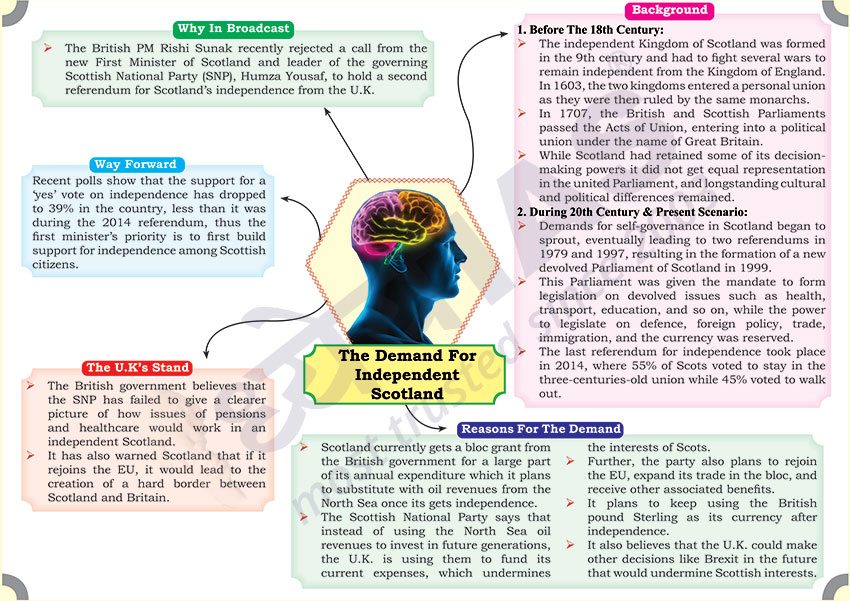Brain-booster /
30 Apr 2023
Brain Booster for UPSC & State PCS Examination (Topic: The Demand For Independent Scotland)

Why in Broadcast?
- The British PM Rishi Sunak recently rejected a call from the new First
Minister of Scotland and leader of the governing Scottish National Party
(SNP), Humza Yousaf, to hold a second referendum for Scotland’s independence
from the U.K.
Background
1. Before The 18th Century:
- The independent Kingdom of Scotland was formed in the 9th century and
had to fight several wars to remain independent from the Kingdom of England.
In 1603, the two kingdoms entered a personal union as they were then ruled
by the same monarchs.
- In 1707, the British and Scottish Parliaments passed the Acts of Union,
entering into a political union under the name of Great Britain.
- While Scotland had retained some of its decisionmaking powers it did not
get equal representation in the united Parliament, and longstanding cultural
and political differences remained.
2. During 20th Century & Present Scenario:
- Demands for self-governance in Scotland began to sprout, eventually
leading to two referendums in 1979 and 1997, resulting in the formation of a
new devolved Parliament of Scotland in 1999.
- This Parliament was given the mandate to form legislation on devolved
issues such as health, transport, education, and so on, while the power to
legislate on defence, foreign policy, trade, immigration, and the currency
was reserved.
- The last referendum for independence took place in 2014, where 55% of
Scots voted to stay in the three-centuries-old union while 45% voted to walk
out.
Reasons For The Demand
- Scotland currently gets a bloc grant from the British government for a
large part of its annual expenditure which it plans to substitute with oil
revenues from the North Sea once its gets independence.
- The Scottish National Party says that instead of using the North Sea oil
revenues to invest in future generations, the U.K. is using them to fund its
current expenses, which undermines the interests of Scots.
- Further, the party also plans to rejoin the EU, expand its trade in the
bloc, and receive other associated benefits.
- It plans to keep using the British pound Sterling as its currency after
independence.
- It also believes that the U.K. could make other decisions like Brexit in
the future that would undermine Scottish interests.
The U.K’s Stand
- The British government believes that the SNP has failed to give a
clearer picture of how issues of pensions and healthcare would work in an
independent Scotland.
- It has also warned Scotland that if it rejoins the EU, it would lead to
the creation of a hard border between Scotland and Britain.
Way Forward
- Recent polls show that the support for a ‘yes’ vote on independence has
dropped to 39% in the country, less than it was during the 2014 referendum,
thus the first minister’s priority is to first build support for
independence among Scottish citizens.







